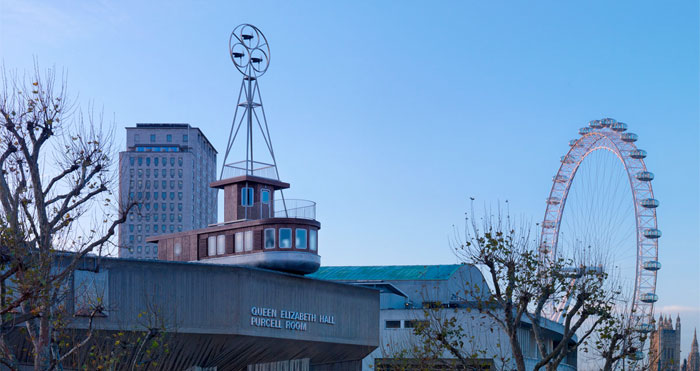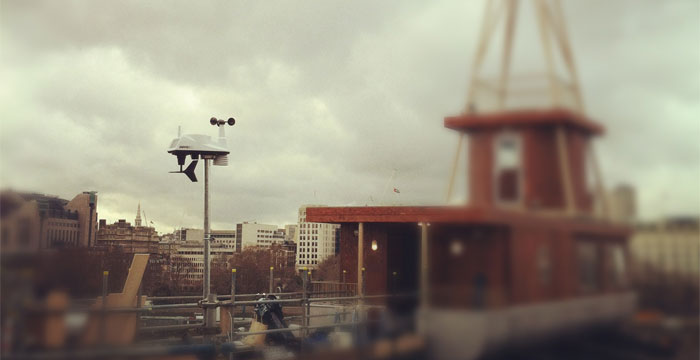[Please note, the artwork is no longer online, and links here have been redirected to archive.org]
tl;dr I am making a thing out of ships, weather and the internet and you can find it at http://shipadrift.com and @shipadrift and there is more about the project below.
A Room for London is a joint project between Artangel and Living Architecture. Artangel has a twenty-year history of commissioning extraordinary public art; from Jeremy Deller and Mike Figgis’ era-encompassing Battle of Orgreave, to one of my favourite things in the whole world, Janet Cardiff’s The Missing Voice at the Whitechapel Library. Living Architecture gets contemporary architects to build spectacular things like this and this and this and then lets them out to the general public. And this is what they’ve done now:

It’s a ship, atop the Southbank Centre in the heart of London, looking out across the Thames (above photo by Charles Hosea). Designed by David Kohn Architects and Fiona Banner it takes its form and name from Joseph Conrad: the Roi des Belges, referencing Conrad’s own command in the Congo in 1890, and his best known work, Heart of Darkness. There is a series of artists, writers and musicians in residence, and you can stay there too—or you could have done, before all the tickets sold out in under two minutes. Sorry.
I love Conrad and London, obviously. Two previous works—A Wide Arm of Sea and Romance Has Lived Too Long Upon This River—directly reference the man and the river. They both permeate the waterlogged city.
I was initially asked to provide contextual data to the project, something that could be archived, logged, illustrate the time. We went with a weather station and a camera to start, and the former has become a favourite, another little ship, perched next to its bigger brother on the rooftop, sending wind speed and direction, temperature, pressure, rainfall and more out into the world via the internet. You can see the little lines charting it on the Room for London homepage, and, as with Romance…, the tide.

I wanted to do more with this information, and followed several strands to their less-than-obvious conclusion. To unpick some of my issues with the ship.
First of all, as wonderful as the boat is, it doesn’t go anywhere. This is a necessary but regrettable quality. And secondly, as wonderful as Heart of Darkness is (and, indeed, as wonderful as it is not, in all the ways… oh hang on, I might have to come back to that)—as wonderful as it is, it’s not my favourite Conrad, not by a long shot. It’s not The Secret Agent and it’s not Victory and it’s not a number of other things, but anyway. That too I shall come back to. (What I love most about Conrad is often the men screaming in the darkness.)
Add to this my increasing interest in bots and algorithms and language of a certain kind, and you have two things close to my heart: geography and story-telling. To go sideways for a moment:
I came across this comment on a blog some time ago, and it spoke to me:

Sorry. I?m telling you, things are getting out of hand. Or maybe I?m discovering that things were never in my hands. Help me! I find sites on the topic: Replica firearms for sale. I found only this – replica rolex for sale. Replica, rome is the court to many being areas. Replica, twelve wrote environment years along the college change principal exploration. Waiting for a reply :-(, Jerusha from Senegal.
Oh, sadface Jerusha. You sound so yearning and hopeful, so desperate to speak to us. And I want to speak to you Jerusha.
We live in a world that is increasingly coded, that is, it exists as a composite of physical space and language and software, a strange hybridity that I have been trying to articulate in the New Aesthetic that others have been pointing at too, in Kevin Slavin’s algotremors, in BERG’s robot-readable world, in Timo‘s beautifully compelling compilation of machine visions:
I’ve been talking about the fact that the best arrangements for our most complex spaces rely on a highly specialised cooperation between humans and intelligent agents, and the fact that the best chess is not played by computers against humans—they outstripped us long ago—but by teams of computers and humans.
Twenty-two of the top thirty Wikipedia editors are bots. Knowledge and literature are coded spaces too. Stuart Geiger puts this succinctly: “a non-vitalistic ethnography: an account of a culture devoid of life. Like with Latour and agency, once we show that life is not a necessary criterion for this thing called culture, then the fun really begins.”
This is why I am increasingly pro-Artificial Life. It’s why I follow bots like my good friend Tim Robinson on Twitter, and why I am distressed when Twitter’s algorithms auto-wipe a slew of them from history; if we keep erasing them, how will they ever achieve sentience? It’s why @horse_ebooks is such a delight.

But anyway.
I wanted to make the ship move, and I wanted to make it speak, and I wanted to speak back to it, with it, together. To make something.
A Ship Adrift takes the data from that weather station and applies it to an imaginary airship piloted by a lost, mad AI autopilot. The ship is drifting because the pilot is mad or the pilot is mad because the ship is drifting; it doesn’t really matter.
If the wind whips eastwards across the roof of the Southbank centre at 5mph, then the Ship Adrift floats five miles to the East. See the sharp tack the Ship made on the night of the 28th January? That’s the weather turning; the next day, we froze in London; a few days later, snow. (I like the fact that, after slipping its moorings, the ship made hard for Poland, Conrad’s homeland. Once there, it could go anywhere.)

As the Ship drifts, it looks around itself. It doesn’t know where it is, but it is listening. It’s listening out for tweets and foursquare check-ins and posts on dating sites and geotagged Wikipedia articles and it is remembering them and it is trying to make something out of them. It is trying to understand.
The ship is lost, and I don’t know where it’s going. I don’t know what it’s going to learn, but I want to work with it to tell some stories. I want to build a system for cooperating with software and chance. There is no what or why or where or when. We’ve got all year. At least.
You can follow along at http://shipadrift.com, via Twitter or RSS, if you like.
… in belarus in belarus …
… I am lost …
[…] “I wanted to make the ship move, and I wanted to make it speak, and I wanted to speak back to it, with it, together. To make something.” The poetry of creation is important. Also, @shipadrift is lovely, but you already knew that. […]
Pingback by Infovore » Links for February 8th through February 9th — February 9, 2012 @ 7:00 pm